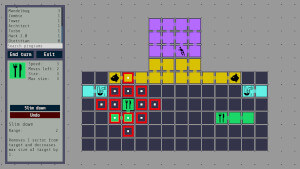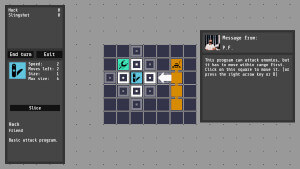by Jay
- 9 minute read - 1714 wordsthis article is part of a series of interviews with developers. Check out this page for more
We were incredibly lucky to have the chance to interview James about his upcoming game Nightfall Hacker. Because of his hectic schedule he was unable to be on the podcast, but he kindly agreed to answer some of our burning questions via email
which we’re incredibly thankful for
so here it is:
For those who might not have played The Nightfall Incident, which this game is a wonderful homage to, could you describe Nightfall Hacker?
You’re a white hat hacker and take jobs eliminating threats for people. You do that by using your programs to fight against the enemy on a 2D grid. You take it in turns, and each program can only move a limited number of squares in one go. When programs move, they form a “tail” up to a specified maximum size. You can attack enemy programs or get attacked, and each attack removes a certain number of sectors. If a program loses all its sectors, it’s eliminated, and the aim is to eliminate all of your enemy’s programs before it eliminates yours.
It’s hard to explain with words, so if you want to see it, watch a gameplay video, or just play it. It’s designed to be easy to get into, but also produce some thought provoking battles.
We’ve been excited to try this game out, as we’re fans of The Nightfall Incident. What was the impetus for creating Nightfall Hacker? Was it a case of wanting to re-create something fun from your younger days?
I’d learned to use Godot
ed. Godot is a video game development environment
and wanted a game to make. Something with the same mechanics as The Nightfall Incident was ideal, because it’s challenging but possible to create, and although there are quite a few other fan projects inspired by it, most of them have been abandoned, and as far as I know there are no other games quite like it.
How did you get into games dev? Is this something you picked up in your spare time, or do you work as a dev?
It’s definitely a spare time thing. I’ve never worked as a dev. But when I was young, I used to imagine what I’d do if I designed a game, and I used things like Adventure Maker to make simple point and click games. I eventually learned Python
ed. a general purpose programming language, named after Monty Python
and tried different game engines to see what I could do. I found most engines cumbersome to use, until I tried Godot. I think their system of nodes and scenes is very intuitive, and lends itself well to development without reinventing the wheel.

The user interface for Nightfall Hacker is wonderfully minimalist (click to enlarge)
How did you go about planning the development of the rules for the game? Adobe Flash is now a relic of a bygone era, so did you resort to old notes or play throughs?
I ran The Nightfall Incident with BlueMaxima’s Flashpoint, or sometimes I just looked up gameplay videos of the particular part I wanted because it was quicker than navigating through the game. The best part was when I needed to know the value of all the credit pickups, but couldn’t find a playthrough that got them all. I had to make my own by playing through the whole game, collecting every credit pickup, and recording it to capture the moment when the value of the pickup is shown on screen. It was slightly tedious to retry levels when I realised I forgot one pickup, but the rest was certainly fun, and I now have probably the most complete playthrough video of that game anywhere.
How do you feel about the death of Adobe Flash? Some of the most innovative Internet content from the late 90s and early 2000s came from that platform.
I have memories of playing flash games, so it does feel like the end of an era, but you have to remember that there’s a reason it’s been discontinued. It had been declining for years, there are more secure alternatives, and you can play the vast majority of old flash games safely with BlueMaxima’s Flashpoint, so we’re not losing much in practice. I think it’s not as big as people are making it out to be.
What are some of your favourite Flash games from back in the day? (other than The Nightfall Incident, obviously)
I have to include Onslaught. It’s a classic tower defence game that requires thought and planning.
Drag Racer v3. My friend at school introduced me to it. I was sceptical because I wasn’t really interested in drag racing, but it works well in a 2D flash game, and I like the wide range of car upgrade options.
Need for Madness. It’s a car racing game that ignores the laws of physics, and that’s what makes it fun. There’s a sequel, but the first one is the one I remember. Before the track editor was a thing you could build your own tracks in the downloadable version by changing values in the included text files.
And of course Stick RPG, because there’s nothing like getting into bar fights and selling cocaine when you’re 8 years old. Really though, it’s a simple idea that’s been well executed.
From the initial idea right up to release, roughly how long did it take to create Nightfall Hacker?
Most gamers don’t seem to fully appreciate just how long it takes to create a well crafted game, such as Nightfall Hacker. So it would be interesting to hear about your experiences
Because I was working on something else, I had the idea some time before I started, so it was probably about two years from the idea until release. From when I started until release, it was a year and a half. In the first few weeks I was adding things to a blank canvas, so it looked like I was progressing very quickly. I estimated that I could finish it in about 8 months. I didn’t anticipate that, as it got more and more complete, I’d have to do more and more fixing errors, polishing and other slow tasks. It’s an example of Hofstadter’s law.

Easy to pick up (this is the tutorial level) but difficult to master (click to enlarge)
The game includes a level editor, did you us this for development purposes (ease of creating new levels, etc.)?
Yes. I made a demo with 7 levels, and I made those by editing the data manually because I hadn’t made the level editor at that point. After that I made sure to make the level editor before the campaigns, because using it made level creation significantly easier. I’d also like to give a shout out to Streer02, who made a lot of the levels in the Smoking Mirror campaign.
The music for the game is wonderfully electronic and sets the tone for the game perfectly. Did you work collaboratively with Alex Ashe on the soundtrack, or did Alex work separately from you?
Somewhere between the two. Usually Alex would start by showing me a track he’d made, and then I’d say something like “can you make this part lower pitched?” and he’d do it, and we’d repeat until we got the final product.
The UI for Nightfall Hacker looks to be a much cleaner and streamlined design compared to The Nightfall Incident. Was this a conscious decision? By reducing the busy UI of the original, it feels like the game is both fresh and easy to get stated with
Yes, it was a conscious decision. I like efficiency. Why include more UI elements when you can do the same thing with fewer elements and simpler colours?
We do a thing on the podcast called Thunder Plain Games (named after the Thunder Plains in Final Fantasy X), it’s a little like Desert Island Disks, but for video games. If you were trapped there, and rescue was on the way, which three games would you take with you?
You can have an Internet connected game, if you wish.
But you cannot tell anyone that you are stuck in the Thunder Plains/on a desert island or ask for help
First, it’s an obvious choice, but Minecraft. The procedurally generated world, thousands of things to build and do, and countless minigames on servers greatly extend the replay value, hopefully enough to last if I have to spend years in the Thunder Plains.
Second, I think Grand Theft Auto: San Andreas, for a similar reason. The world is so big, and there are so many side quests, it’ll take a while before I get bored. Add SA-MP for multiplayer too. I was torn between GTA V and San Andreas for this slot, but chose San Andreas because of nostalgia, and because of V’s cancerous online community.
Third, Worms Armageddon. Not so much for its replay value this time, but more because some of the battles are quite thought provoking, despite its comedic nature.
Here’s a trailer for the game:
Here’s a note from Novy Unlimited
who were amazing in helping set up this interview for us
about the game:
Developed by UK studio Teradile, Nightfall Hacker turns white hat hacking into no holds barred, unflinching turn-based strategy skirmishes against malicious software and dangerous payloads. It is available now for Windows, MacOS, and Linux via it’s Steam page. The OST for the game is available on BandCamp. You can follow Teradile on Twitter (@teradile) and watch some videos showing the development progress of the game at the Teradile account on Lbry.
Our thanks for arranging this interview go out to Luis at Novy Unlimited, and to James for taking the time to answer our questions. I really like the look and feel of this game, and am looking forward to trying it out. Make sure that you check out the Steam page for the game, and let us know what you think of it.
External Links of Interest
- Teradile
- Godot
- The Nightfall Incident
- BlueMaxima’s Faslhpoint
- James’ recommended Flash games:
- Nightfall Hacker on Steam